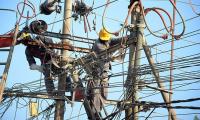Corruption has contaminated our society to such an extent that it has become an integral part of our social behaviour and the system in which all of us operate.
When a social evil becomes pervasive in society, the social structures, institutions, laws, rules and regulations become tolerant towards it. When the social evil permeates further, the system starts adjusting itself to accommodate it.
The system eventually starts protecting the social evil. At the final stage, the system and the social evil are intertwined to such a degree that they become one and the same – the social evil becomes the system. The system subsequently demands compliance with the social evil from individuals. This is the case of corruption in relation to our system.
Honest people, who are already rare, are in hot water everywhere. Bare survival and the fulfilment of basic needs is their chief challenge, no matter how well placed they may be. Those who are categorised as extremely corrupt may also find themselves in constant trouble. The majority, however, survives and even grows on a hodgepodge of white and black sources of income.
Every vocation has its own peculiar way of showing compliance to the norm of corruption. The bureaucracy has everything hidden in its files. These files are then hidden deep in the dusty shelves of record rooms, far away from the reach of any right to information act. Businessmen also have their own ways of complying with the norms of corruption by manoeuvring accounts, rigging returns, extending ‘gifts’, and holding protests if the need arises. The judicial system has its own subtle ways – away from public scrutiny and shrouded in the regimes of contempt laws and bar rules.
What happens in the affairs of other institutions of the state, we are not even allowed to discuss. But a politician’s corruption is completely exposed to everyone. In the morning, news stories, editorials, op-eds and the social media cross-examine them and at night prime-time courts summon and question them. The stories of their corruption echo in parliament and serve as a ready excuse to topple civilian governments. Their corruption becomes fodder for political sloganeering in rallies and is then imprinted in the social consciousness through various titles.
If I say everyone and his brother is corrupt with respect to other professions, I will immediately face backlash and receive reminders about how I am making a sweeping statement and everyone cannot be tarred with the same brush and there are always the exceptions. But if I make a similar statement about the corruption of politicians, hardly any defender will come forward.
The benchmark to judge Nawaz Sharif’s corruption should not be the ‘perfect man approach’. On the contrary, it has to be an approach with comparative underpinnings, taking into consideration the system and the corruption symbiosis that I have mentioned above. In other words, we have to see if Nawaz Sharif is more corrupt than his alternatives – like Asif Zardari and Imran Khan – or less? Is governance under him at the centre and Punjab more corrupt than the state of affairs under Asif Zardari in Sindh and Imran Khan in KP?
If all those who are casting stones on Nawaz Sharif today were told to let only those who are ‘without corruption’ among them to be the first to criticise him, it will become difficult to find the right people for the task.
Articles 62 and 63 of the constitution, if not applied in letter and spirit, will weaken the pillars of the state.
Imran Khan has, rather rhetorically, offered himself to be judged under the same articles along with Nawaz Sharif. Given that cases against him are already pending before the Supreme Court, it would be in everyone’s interest if those cases were also clubbed with the Panama case and both Imran Khan and Nawaz Sharif were judged alike on the touchstones of the above articles.
The writer is a former diplomat and
currently practises law.
Email: aiddi11@gmail.com
Punjab, with its population of over 120 million, stands at a critical juncture in its history
Events leading up to the upcoming protests and beyond are a powerful reminder of Pakistan’s once relatively...
Efforts are alas now being made to fragment the HEC and hand over the pieces to the provinces
Pakistan’s total electricity consumption, as measured in terms of sales, has decreased to 112.9 TWh in FY2023 from...
Any progressive society or government will uphold security so that people can utilize their full potential
In Pakistan, we have witnessed erosion of public trust in government institutions







